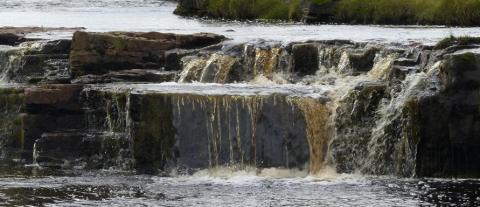The UK uplands supply a high proportion of the country’s drinking water. Climate change threatens to influence the quality and treatability of this supply as a consequence of its impacts on biological and chemical processes within catchment soils and reservoirs. A particular concern is how climate change will influence levels of dissolved organic matter (DOM) in these water sources as excessive concentrations of DOM pose major financial and operational challenges for the water industry. This project brings together biogeochemists, limnologists, hydrologists and climate modellers from the scientific research community (Centre for Ecology & Hydrology, University of Leeds and University of Glasgow), with plant operators, planners and catchment scientists across the water industry, to enable prediction of future impacts and inform best practice climate resilience strategies for water companies. The project builds on the recent NERC ERIIP-funded FREEDOM project (Forecasting Risk of Environmental Exacerbation of Dissolved Organic Matter).
The water industry faces intensifying risks to its water treatment systems through rising DOM concentrations, especially in upland raw water supplies which provide 70% of the UK’s drinking water. Rain and meltwater percolating through soils transports DOM to reservoirs. The water industry has to restrict DOM concentrations to minimise taste and odour problems, reduce the potential for algal growth, and prevent the generation of potentially harmful levels of disinfection by-products, formed from reactions between DOM and chemical disinfectants. DOM concentrations are increasing primarily as a result of an increase in soil organic matter solubility in response to regional reductions in atmospheric pollutants to soils. However, DOM levels in upland waters are also sensitive to variation, and long-term change, in soil temperatures, amounts and intensity of precipitation, the ionic strength of soil waters, the residence time of reservoirs, and sea salt deposition events during winter storms. The influence of these climate-related effects is increasing as organic matter continues to become more soluble.
Currently, the primary industry approach to reduce DOM concentrations is the application of coagulant to precipitate the organic matter from the water, but additional filtration may also be required to remove DOM compounds that are less sensitive to this chemical effect. Both processes have a significant carbon footprint and are estimated to have already cost the industry hundreds of millions of pounds through the installation of new equipment where existing infrastructure was no longer able to deal with rising DOM concentrations. There is a pressing need, therefore, to foster a Climate Change Resilience Community that will combine the extensive expertise of the research and industry communities in the UK in order to address this challenge. FREEDOM-BCCR will develop an entirely new approach to understanding, managing, and planning responses to DOM increases in response to climate change. The community will provide the basis of support for decision making and will deliver adaptive (e.g. infrastructure investment) and mitigative (e.g. land-use interventions) approaches with which to build resilience in the upland water supply. We will augment the capability of a prototype Decision Support tool (DSt), developed by the current NERC FREEDOM Project with support from for Scottish Water, by incorporating catchment-specific climate change projections, predictive models and industry knowledge. This development of the FREEDOM DSt will fill critical knowledge gaps in model functionality including climate change impacts on soil and in-reservoir processing of DOM. We will define operational thresholds for DOM quantity and quality across the treatment chain and combine these to produce forecasts, at a UK scale, of DOM risk to drinking water supply. Proposed activities and respective Work Packages include: generation of UKCP18-based climate change projections using Hydro-JULES downscaled to specific catchments (WP1); Coupling of downscaled climate predictions with catchment and lake/reservoir models to explore the potential impact of climate change in influencing seasonal variation in DOM quantity, quality and vertical distribution in priority intensively monitored drinking water reservoirs and their catchments (WP2); validation of predictions of DOM quantity and quality produced by the FREEDOM DSt, beyond the parameterisation data set from Scottish Water, using hind-casting informed by wider UK industry data (WP3); upscaling application of the FREEDOM-UK DSt to provide predictions of the effects of climate change, land-use change and air pollution scenarios on DOM quantity and quality in other regions of the UK (WP4); and, foster the FREEDOM Climate Change Resilience Community focussing on co-development, application, and showcasing the FREEDOM-UK DSt through a programme of knowledge exchange activities (WP5).
Watch Climate Resilience webinar, 4 November 2020: Forecasting risk of environmental exacerbation of dissolved organic matter – building climate change resilience with Don Monteith (UK Centre for Ecology & Hydrology) and Fraser Leith (Scottish Water). Part 1, part 2, and part 3.

